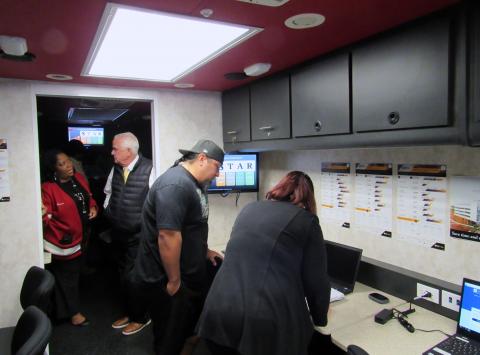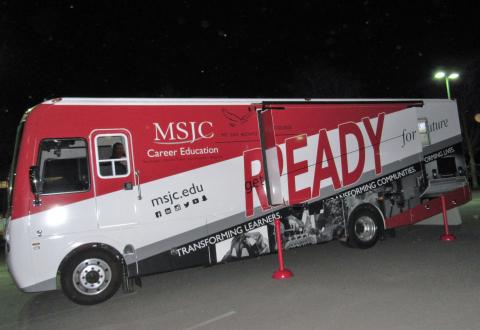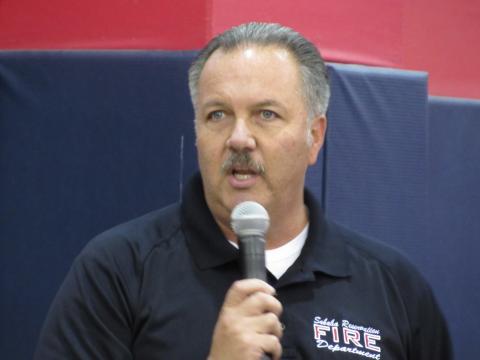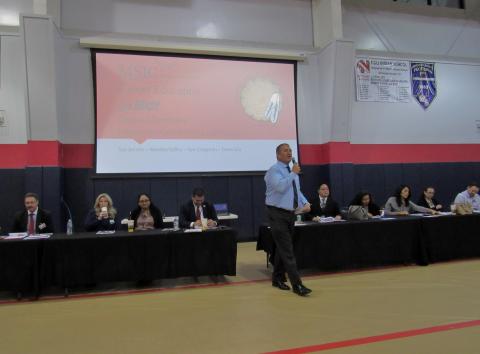Career development has long been an important part of Mt. San Jacinto College’s mission to prepare students for the next chapter of their lives. Through a partnership with the Soboba Band of Luiseño Indians, opportunities at many tribal entities can be met through the college’s newest programs.
Soboba’s Tribal Administrator Michael Castello said the community college reached out to the tribe last summer. Jerry Livesey is the Project Lead serving as the liaison for the college and tribe and said it was important for college president Roger Schultz to work with Soboba in order to meet its needs.
“We are responding to what we heard the tribe needed,” Livesey said. These desires seem to be the same as MSJC’s vision of transforming learners, lives and communities.
“Soboba is one of the largest employers in Riverside County and we offer a wide array of jobs,” Castello said. “Having this partnership with MSJC for our members to gain education and skills really fits into what our needs are as a tribe.”
It is a win-win arrangement as Soboba has about 1,500 positions at the year-old Soboba Casino Resort but only about 100 are filled by tribal members. The proposed program will help those who want to work for the tribe find out what is needed and be able to take specific classes to reach that goal.
A workshop to introduce the program that was secured through a Memorandum of Understanding between the tribe and the community college was held on Feb. 6. Presenters from the college spoke about how certain classes have been designed to meet the needs of specific job positions. Speakers from several tribal entities outlined the type of employees they need and how these college courses will give students the necessary knowledge to be competitive in the hiring process.
The MOU outlines the collaboration that will seek to create a solution or second chance for Soboba’s youth and adults to gain the knowledge, skills and attitudes needed to be prepared for professional careers, to be productive members of their tribe and to achieve a richer life, greater independence and self-sufficiency.
Career Education Counselors Betsy Ramos and Sonia Verduzco shared a slide presentation at the workshop to highlight a number of career development options available.
“We all work hand-in-hand to try and get people jobs,” Ramos said. “Some courses are fully online, some are hybrid and others are face-to-face. We take a holistic approach in offering the best experience for our students.”
Verduzco outlined some of the certification programs that are available.
“These are not just programs we offer but they are directly connected to jobs in the community,” she said.
Amy Campbell, director of non-credit programs at MSJC, spoke about the various adult education opportunities that exist from GED instruction to introductory career classes in culinary, business, construction, child development and more. Taught by experts in the industry, all of these classes are free.
“Taking an introductory class is a good way to let you see if a particular career might be a good fit for you,” she said. “We offer support in many areas.”
Also offered are classes in “soft skills” to help students identify their own skills and learn how to articulate them in an interview or on an application or resume to increase their employability.
Representatives from several different Soboba entities described the type of employees they are seeking, stressing that they are always willing to work with an individual’s school schedule to help them meet their goals.
Soboba Hotel Director Grant Hirata said there is a plethora of positions within the hotel’s operations that are considered entry level.
“It’s not where you start but where you can end,” he said. “With dedication, you can excel through many levels of employment. It’s a great career path.”
Steve Nino is Soboba’s Chief Information Officer and has worked for the tribe for 14 years. He handles IT (information technology) functions for the tribal administration business side of things as well as the tribal side.
“I have seven employees on my staff that went to MSJC,” he said. “The first step is to get seven units (in CIS) which is very attainable and then use that as a steppingstone to build your career.”
Ken McLaughlin is the Soboba Public Works Director who wanted everyone to know that there are many opportunities at his department which include mechanics, electrician, turf management and heavy machine operators.
“At any time, we touch all the other departments,” he said. “Our department is very diversified and the careers are rewarding.”
Victor Mortazavi is director of food and beverage at the Soboba Casino Resort.
“This is the largest department at the resort with about 420 employees and 40 different positions – our needs are endless,” he said.
MSJC also brought its mobile career center to the recent workshop to show how easy it is for potential students to meet with a counselor, sign up for classes and have questions answered. Naomy Dominguez, a senior at San Jacinto High School, visited the mobile unit to learn how she can maximize her nursing classes at MSJC. She said it was simple to take an online assessment on one of the many computers that were on board.
Carrie Tate-Meyer was welcoming visitors to the mobile career center and giving them a tour of all it had to offer. She said the goal is to strengthen the college’s relationship with Soboba and help the tribe fill any hiring needs in a variety of ways.
For further information, please visit www.msjc.edu.
Photos courtesy of Soboba Band of Luiseño Indians






